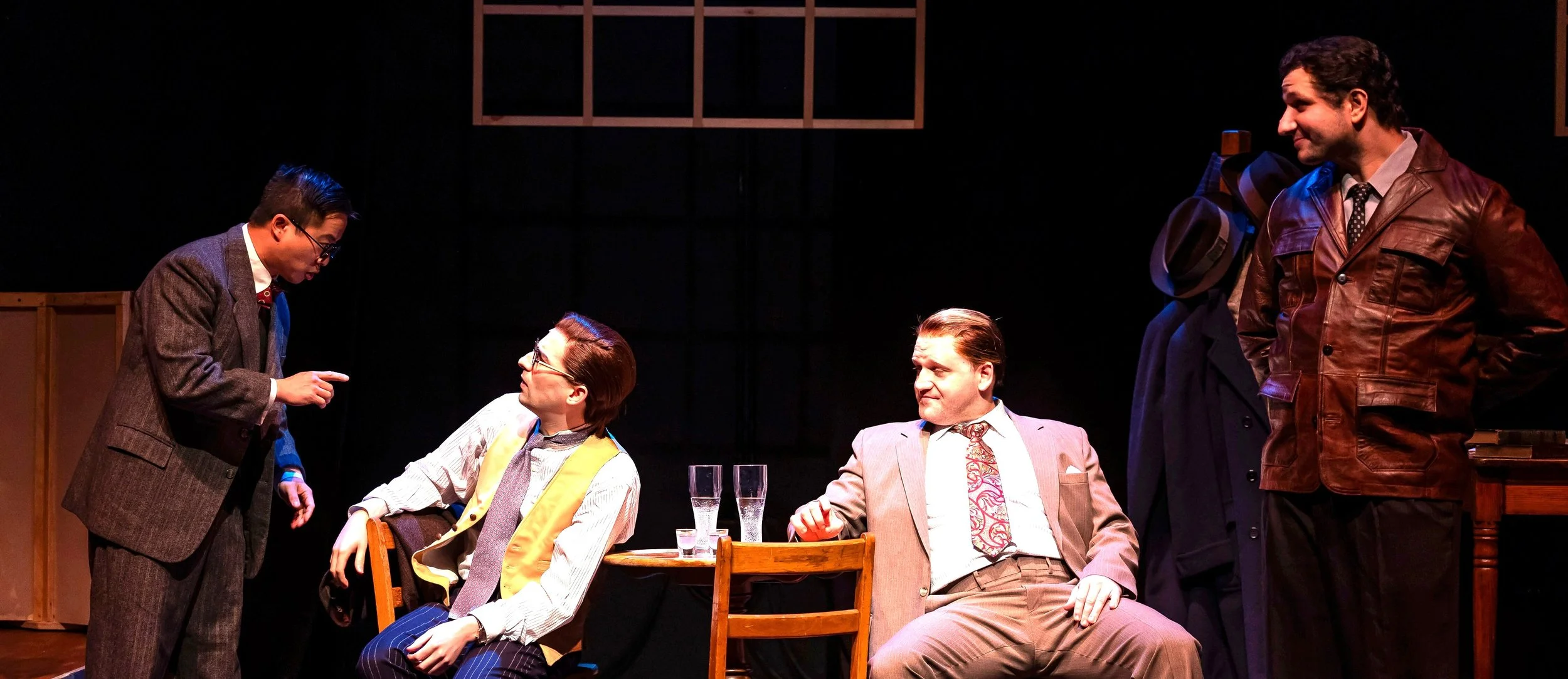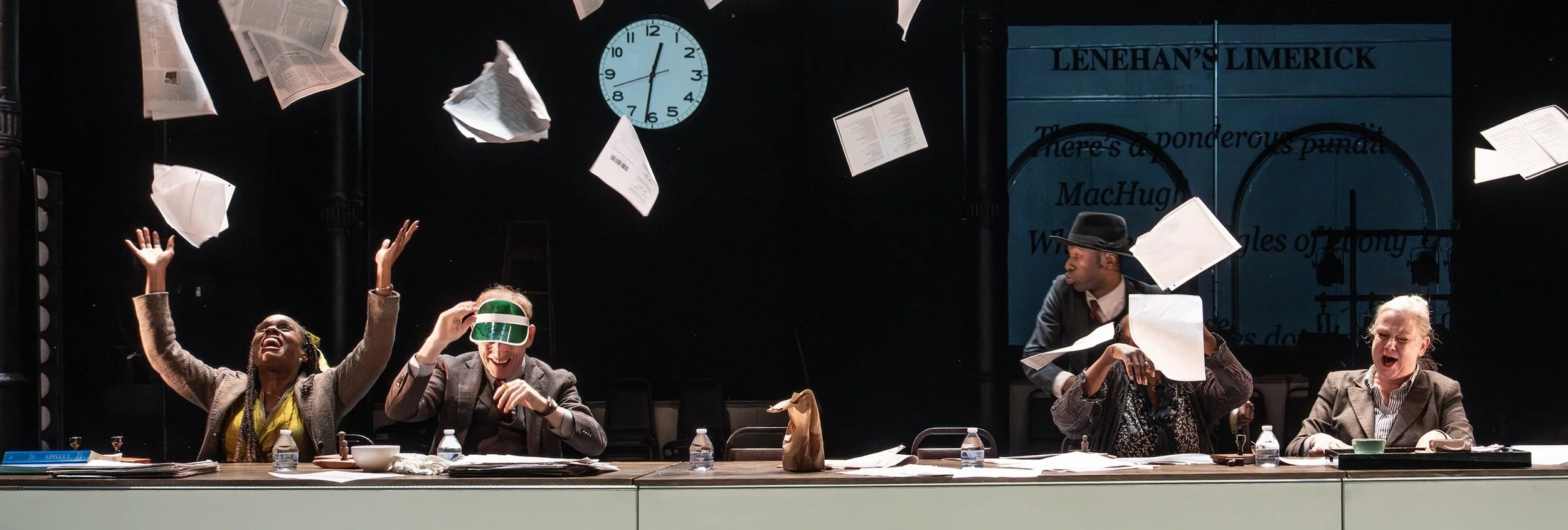Tennessee Williams’s The Night of the Iguana is often considered his last great play, but the 1961 milestone was created amid stress and anguish. The role of Hannah Jelkes was written for Katharine Hepburn, but Spencer Tracy needed her care; Margaret Leighton played it and won a Tony. Bette Davis, difficult to imagine as the sensual Maxine Faulk, was at her most tyrannical during tryouts; she left the production after three months. Elia Kazan didn’t direct, though he lauded the work of Frank Corsaro, who did. In the end, however, the play survived, but La Femme Theatre Productions’ revival, the first in 28 years, demonstrates that pitfalls abound.
Buena Vista Social Club
Theatergoers who yearn for a tropical getaway need look no further than the musical Buena Vista Social Club, set in Havana, Cuba, and alternating between 1996 and 1956. With music by the eponymous collective—the subjects of German director Wim Wenders’s 1999 documentary that inspired this production—the show presents young and old versions of the principal characters (played by different actors) as they cut their professional teeth as artists and learn to jam—and survive tough political times—together.
Death, Let Me Do My Show
A specter is haunting Rachel Bloom—the specter of death. In fact, Death is sitting in the fifth row of her show, Death, Let Me Do My Show, looking suspiciously like Bloom’s friend David Hull, the “moderately successful actor who seems stuck between leading man and character roles” (as she describes him). And Death insists on being acknowledged, contrary to Bloom’s plan to deliver the show as she conceived it in 2019.
Mind Mangler: A Night of Tragic Illusion
Mind Mangler: A Night of Tragic Illusion is a new parody from the creators of The Play That Goes Wrong—this time aimed at magicians. The production is about the relationship between a magician and his stooge, played by Henry Lewis and Jonathan Sayer respectively, who cowrote this show as well as Play That Goes Wrong with Henry Shields. While Mind Mangler easily segues back and forth from a spoof of a magic show to actual sleight of hand to a dramatic story involving the two leads, not all its parts are equally successful.
Export Quality
Export Quality, a play centered on the mail-order bride system in the Philippines—a practice that usually leads to the trafficking, rape, abuse and death of many women by American men. Although the mail-order bride industry has existed for decades, Export Quality is a reminder to the public that this issue persists. The four main characters who introduce themselves at the outset are commodified and stripped of their fundamental human rights—sentenced to a life of indentured servitude.
Unconfined
Unconfined is a solo theater piece based on real-life events that asks a fundamental question: What does it mean to really know another person? In this case, the question is more difficult than usual, as the person to get to know is on lockdown on death row. The story of a seemingly kind, thoughtful, creative, and spiritually sophisticated convicted murderer came to playwright Liz Richardson’s attention when she “received a binder of extraordinary poems, drawings, and letters by a prisoner who had been on death row for 18 years,” as noted in the program. She wrote the piece based on her own research and interviews. Richardson portrays three characters who all interacted with the unseen, unnamed protagonist while he was imprisoned: Barbara, a professor of comparative religion at a Southern university; Eleanor, an English artist; and a fellow death-row inmate, Benny.
Adrift
This time of year it may seem that every holiday tradition from around the world has been commodified in the United States, but one that hasn’t caught on is the British panto, a comic family entertainment widely produced throughout the U.K. at Christmastime. Happenstance Theater, the Washington, D.C.–based troupe behind Adrift, doesn’t name panto as one of the many influences on its quirky and clever show, but there are similarities: a vaudevillian essence, British accents, physical comedy, musical interludes, commedia dell’arte–type characters, audience participation, elaborate costumes, a touch of the ribald.
The Gardens of Anuncia
Michael John LaChiusa’s new memory musical, The Gardens of Anuncia, is a love letter to Broadway legend Graciela Daniele and an homage to the three woman who shaped her life in Juan Perón’s Argentina. Sensitively directed by Daniele, it offers one not only a glimpse of the icon before she became famous for her choreography but a portrait of the artist as a mature woman, looking back on her star-dusted life. LaChiusa, who created the book, music, and lyrics, has earned a reputation in the American musical theater as a maverick who never repeats himself. And, indeed, his latest venture cements his image.
Lone Star
The ambitious and curious Ruth Stage has resurrected Lone Star by James McLure, a one-act that was first presented Off-Broadway in 1979 on a double bill with McLure’s Pvt. Wars. The play Lone Star is not to be confused with John Sayles’s 1996 movie Lone Star, although, by a strange coincidence, the late character actor Leo Burmester appeared in both the play and the film.
Madwomen of the West
To paraphrase Chekhov, if a piñata is dangling from the ceiling as a show begins, should it not be swatted down in time for the final curtain? Well, in the case of Sandra Tsing Loh’s Madwomen of the West, the piñata is left intact, but the façades of its four characters are broken open to reveal some big secrets. Unfortunately, by the time these confidences are divulged, their importance has been overshadowed by the production’s self-referential gimmickry. It is the handicraft of Brecht, not Chekhov, that is at work here as the audience is constantly taken out of the world of the play with the performers speaking directly to them, or reciting stage directions aloud, or dropping character altogether.
Spain
Jen Silverman’s Spain is inspired by a kernel of historical fact—just a kernel. It concerns a documentary, The Spanish Earth, calculated to rouse sympathy in the United States for Spain’s Second Republic in the long civil war against General Francisco Franco’s fascist insurgency. There was (or, rather, is) such a documentary, produced by Dutch filmmaker Joris Ivens and American editor/producer Helen Van Dongen, released in 1937. A number of noteworthy American intellectuals worked on the film, including novelists Ernest Hemingway and John Dos Passos, playwright Lillian Hellman, actor Orson Welles, poet Archibald MacLeish, and composer Virgil Thomson. In stage directions, Silverman writes that Spain is not “a history play in the most conventional meaning.” It’s “set in 1936 in the West Village,” she says, then adds, “Sort of.” This 90-minute comedy-drama is an absurdist-tinged fantasy that seizes a moment of history and bends it to the breaking point.
’Til Death
Watching somebody you love die is terrible. Watching somebody you don’t care about die is a whole other type of painful—one you can experience at ’Til Death, a muddled new drama in which the estimable Judy Kaye plays terminal cancer patient Mary Gorman.
A Good Day to Me Not to You
In her new solo show, A Good Day to Me Not to You, writer and star Lameece Issaq plays a wonderful, quirky, neurotic aunt—the type who makes you feel safe. It’s a character (identified only as Narrator) who is at odds with her situation in the play: according to a shaman, she carries “a spiritual infection” that has metastasized to her body, in the form of genital warts, or possibly from her body to her soul—it’s in both, and presents itself in a fear of sex, a fear of loneliness, and the Narrator’s withdrawal from the messiness of life to a nunnery. Even there, her life isn’t completely without angst—she meets a deranged woman, who greets her with “A good day to me, not to you.”
The Jerusalem Syndrome
It is not unusual for musical comedy characters to undergo transformations. The genre is filled with lonely women who find love, vindictive men who turn generous, and insecure bumblers who gain confidence. All of the above are on display in the York Theatre Company’s breezy premiere of The Jerusalem Syndrome, but the writing team of Laurence Holzman and Felicia Needleman serve up this evolution with a new twist. Well, an ancient twist, actually. By play’s end, its five leads are all better people. But they achieve this feat by spending most of the show thoroughly convinced that they are characters from the Bible.
Amid Falling Walls
It may seem contradictory—perhaps even cavalier and disrespectful—to create a musical about deprivation and brutality in the ghettos when European Jewry’s destruction was at its height. Yet despite the death and disease under German occupation, the arts, particularly music, flourished. Writer and librettist Avram Mlotek, who curated songs from those dark days in Amid Falling Walls (in Yiddish Tsvishn Falndike Vent) has showcased just that. His co-curator and father, musical director Zalman Mlotek, and director Matthew “Motl” Didner, have enabled both Yiddish and non-Yiddish speaking audiences to share in an immersive experience. English-speaking audiences can share this experience via supertitles, projected above and at the periphery of the stage.
Covenant
Audience noise is usually a nuisance in the theater: pinging smartphones, the rustling of bags, hacking coughs. York Walker’s Gothic horror play Covenant, however, elicited the more gratifying sounds of audience shrieks and gasps. Wonderfully inventive staging in the tiny Roundabout Underground space and a first-rate ensemble allow shocks and scares to flourish, mostly overcoming some lapses in the writing or plot twists that might not withstand too much scrutiny. Under Tiffany Nichole Greene’s direction, Covenant is genuinely scary, and that it achieves this for an audience inundated with high-budget, digital effects–driven entertainment is a testament to the theatrical craft on display.
Monsieur Chopin
Hershey Felder, the pianist and actor who has embodied musicians such as George Gershwin and Ludwig van Beethoven in previous shows, is Fryderyk Chopin in his latest stage biography, Monsieur Chopin, directed by Joel Zwick. In the script he has written, Felder climbs into the skin of Chopin, and reveals both the highs and lows of the 19th-century Polish pianist-composer’s life and career.
Arcadia
Tom Stoppard, whose 1993 comedy Arcadia is being revived by Bedlam, turned 86 last summer and, to the extent discernible from afar, he’s going strong. A year ago Stoppard was in New York for the premiere of Leopoldstadt, an emotionally charged, multigenerational epic. Set in Vienna during the Holocaust, that late-career masterwork proved surprising even for a playwright who’s known to avoid doing anything twice. When it was new, Arcadia was also a surprise. It represents the dramatist in midcareer, his imagination careening among a wild assortment of topics: English landscape gardening, quantum physics, the theory of deterministic chaos, and the peril for researchers of what’s inscrutable in the historical record (as, for example, gaps in the biography of George Gordon, Lord Byron, an important offstage character).
Translations
More than 40 years have passed since Brian Friel’s Translations premiered, but Doug Hughes’s haunting new production shows that this play remains relevant as it explores the darker issues surrounding Anglo-Irish relations and the profound problem of language.
Waiting for Godot
When Samuel Beckett’s own production of Waiting for Godot—in German—toured to London’s Royal Court theater in 1976, Guardian critic Michael Billington noted that the actors playing Estragon and Vladimir were “physical and temperamental opposites.” Vladimir was huge and ungainly; Estragon was “short legged, crab-gaited … and moonfaced.” In Arin Arbus’s strong production of Beckett’s despairing modernist masterpiece, Paul Sparks and Michael Shannon aren’t so physically distinct, but their individual temperaments land where they need to.


























